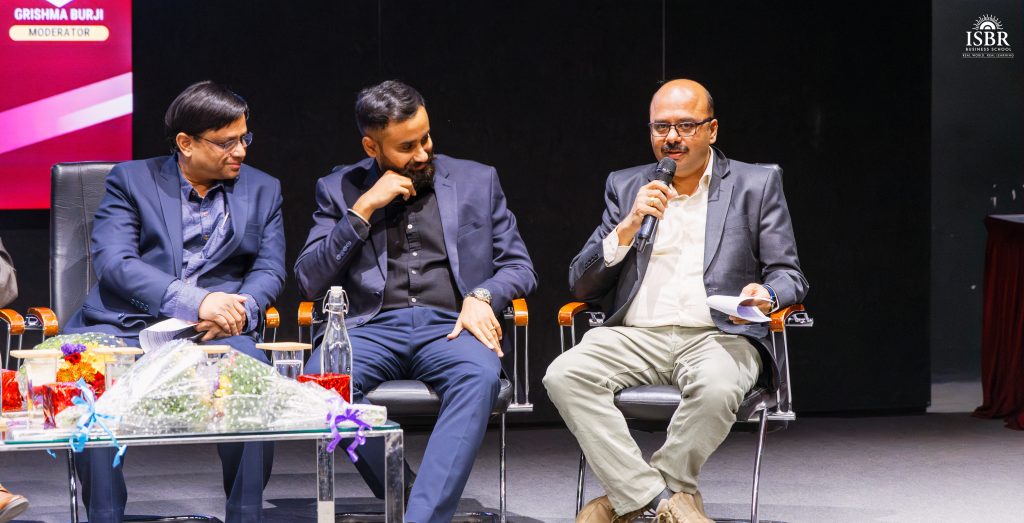A Deep Dive into India’s Economic Future
The Finance Panel Discussion on “Demystifying the Dream Budget 2025-26” brought together distinguished experts from various domains to analyze the impact of budgetary policies on India’s economy. The panel featured prominent voices in infrastructure, finance, taxation, banking, operations, and strategy, who debated critical aspects such as investment strategies, taxation policies, sustainability, and economic growth.
Panelists:
- Santosh G – Global Chairperson, Global Council for the Promotion of International Trade
- Kishore Dasika – Vice President, Swiss Re
- CA Anuj Jain – Financial Controller & Educational Initiatives
- Rohit Jain – Principal Director, Accenture
- Pavan Rangachar -Director – Finance, Phillips
- Parthasarathy Radhakrishnan – Senior Consultant, Deloitte
- Shambhu Bhotika – CFO, UPSL Bangalore
- Sanjay Kurpad – Senior Finance Controller, Cisco

Breaking Down the Budget 2025-26
Private vs. Public Investment: Who Drives Growth?
The panelists debated whether private or public investment should be the driving force behind economic growth.
- Santosh G emphasized that while private investment brings efficiency, large-scale infrastructure development requires government backing for long-term national benefits.
- Kishore Dasika pointed out that private sector participation is essential but must be supported by stable policies and incentives.
- Parthasarathy Radhakrishnan raised concerns over excessive reliance on private investments, warning that weak regulations could lead to economic instability.
Tax Cuts vs. Fiscal Responsibility: Smart Move or Future Problem?
- Anuj Jain highlighted that tax relief increases disposable income, stimulating consumer demand, but it may reduce government revenues needed for essential public spending.
- Sanjay Kurpad stressed the importance of fiscal discipline to prevent excessive government borrowing and a widening fiscal deficit.
AI, Education & Innovation: Is India Future-Ready?
- Shambhu Bhotika appreciated the government’s push toward AI, deep tech, and education initiatives but called for stronger industry-academia collaboration.
- Pavan Rangachar questioned whether these programs would produce job-ready graduates or remain theoretical exercises lacking practical application.
Clean Energy & Sustainability: Can India Go Green Without Slowing Growth?
- Santosh G hailed India’s investments in nuclear and solar energy as transformative for long-term sustainability.
- Pavan Rangachar pointed out that while green technology manufacturing is costly, government incentives and policies will play a crucial role in balancing growth and sustainability.
Make in India: Job Boom or Just Hype?
- Kishore Dasika expressed optimism about India’s potential as a global manufacturing hub but stressed the need for a highly skilled workforce.
- Parthasarathy Radhakrishnan cautioned that low-wage jobs in manufacturing might exacerbate economic disparities rather than alleviate them.
Startups: Is More Time the Solution?
- Anuj Jain noted that while tax benefits for startups are helpful, easier access to funding is even more critical.
- Shambhu Bhotika added that mentorship and global market access are just as vital as tax incentives in fostering a thriving startup ecosystem.
Ease of Doing Business: Faster Growth or Higher Risks?
- Sanjay Kurpad advocated for corporate governance measures to promote growth while mitigating the risk of financial fraud.
- Parthasarathy Radhakrishnan warned that reducing regulations might attract investments but could also lead to increased corporate malpractices.








Bold Predictions & Lasting Impacts: What Lies Ahead?
The panelists agreed that while the budget presents opportunities for economic growth, its success depends on effective policy execution, regulatory balance, and strategic investments. The discussion underscored the importance of striking a balance between private and public investments, fostering innovation while ensuring job readiness, and encouraging ease of doing business while maintaining corporate integrity. Ultimately, the Dream Budget 2025-26 holds great promise, but its impact will be determined by how well its policies are implemented in the real economy.
About ISBR Business School: ISBR Business School, located in Bangalore, India, is a premier institution dedicated to providing world-class education in business and management. Accredited by the NBA and recognized by the Association of Indian Universities and the Ministry of HRD, Government of India, ISBR has consistently been ranked as a platinum institute by AICTE-CII. With a diverse student body, a strong emphasis on industry collaboration, and a curriculum designed to foster innovation and leadership, ISBR Business School is committed to shaping the business leaders of tomorrow. The school’s robust placement record and partnerships with top global companies underscore its commitment to excellence and career readiness for its students

